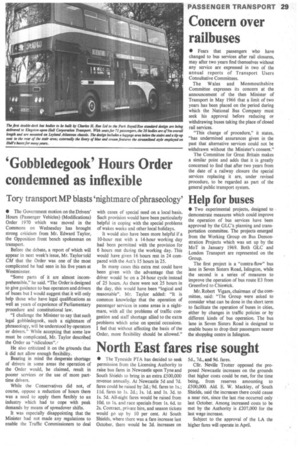'Gobbledegook' Hours Order condemned as inflexible
Page 31

If you've noticed an error in this article please click here to report it so we can fix it.
Tory transport MP blasts 'nightmare of phraseology'
• The Government motion on the Drivers' Hours (Passenger Vehicles) (Modifications) Order 1970 which was moved in the Commons on Wednesday has brought strong criticism from Mr. Edward Taylor, the Opposition front bench spokesman on transport.
Before the debate, a report of which will appear in next week's issue, Mr. Taylor told CM that the Order was one of the most complicated he had seen in his five years at Westminster.
"Some parts of it are almost incomprehensible," he said. "The Order is designed to give guidance to bus operators and drivers of buses but I would suggest that it will only help those who have legal qualifications as well as years of experience of Parliamentary procedure and constitutional law.
"I challenge the Minister to say that such legal gobbledegook, such a nightmare of phraseology, will be understood by operators or drivers." While accepting that some law must be complicated, Mr. Taylor described the Order as "ridiculous".,
He also criticized it on the grounds that it did not allow enough flexibility.
Bearing in mind the desperate shortage of drivers in some areas the operation of the Order would, he claimed, result in poorer services or the use of more parttime drivers.
While the Conservatives did not, of course, oppose a reduction of hours there was a need to apply them flexibly to an industry which had to cope with peak demands by means of spreadover shifts.
It was especially disappointing that the Minister had not made any regulations to enable the Traffic Commissioners to deal with cases of special need on a local basis. Such provision would have been particularly helpful in coping with the special problems of wakes weeks and other local holidays.
It would also have been more helpful if a 10-hour rest with a 14-hour working day had been permitted with the provision for 6 hours rest during the working day. This would have given 16 hours rest in 24 compared with the Act's 15 hours in 25.
In many cases this extra rest could have been given with the advantage that the driver would be on a 24-hour cycle instead of 25 hours. As there were not 25 hours in the day, this would have been "logical and reasonable". Mr. Taylor added: "It is common knowledge that the operation of passenger services in some areas is a nightmare, with all the problems of traffic congestion and staff shortage allied to the extra problems which arise on special occasions. I feel that without affecting the basis of the Order, more flexibility should be allowed."




































































































